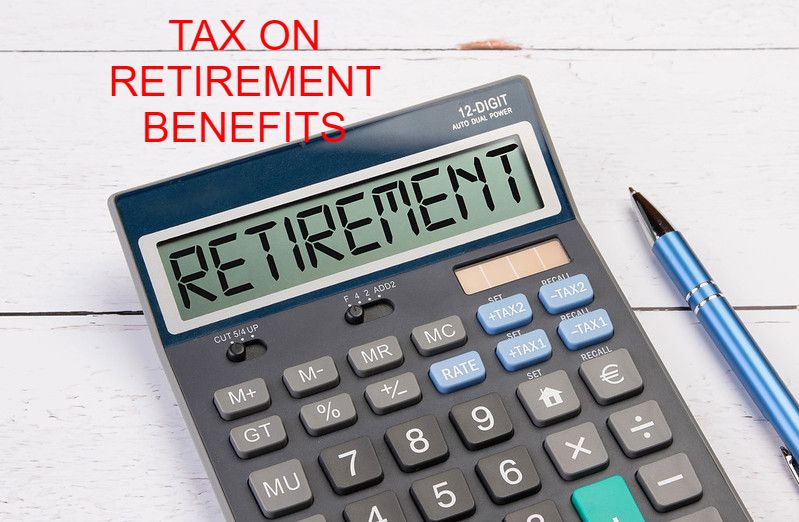TAX ON RETIREMENT BENEFITS
Each of the retirement benefit like gratuity , commuted pension , leave encashment and provident fund have separate treatment for tax purpose and read the article for taxes and exemptions on each of them
The Article on ” TAX PLANNING FOR FY 2024-25 CONTAINS 5 PARTS
PART I: MAJOR CHANGES IN TAX RULES FOR FY 2024-25 CLICK HERE
PART 2: TAX RATES / SLABS FOR FY 2024-25 CLICK HERE
PART 3: TAX REBATES FOR FY 2024-25 CLICK HERE
PART 4: ESTIMATE YOUR INCOME TAX /ADVANCE TAX FOR FY 2024-25 : CLICK HERE
: PART 5 : TAX ON RETIREMENT BENEFITS READ THE ARTICLE BELOW

TAX ON LEAVE ENCASHMENT ON RETIREMENT : Limit Enhanced
Dated 26.05.2023 : As per the budget announcement made by the Finance Minister Ms Nirmala Sitharaman , the Central Government has notified the increased limit for tax exemption on leave encashment on retirement or otherwise of non-government salaried employees to Rs. 25 lakh with effect from 01.04.2023.
The aggregate amount exempt from income-tax under section 10(10AA)(ii) of the Act will not exceed the limit of Rs. 25 lakh where any such payments are received by a non-government employee from more than one employer in the same previous year. Further, the amount exempt from income-tax under section 10(10AA)(ii) of the Act will ll not exceed the limit of Rs. 25 lakh as reduced by the tax exemption already allowed in the total income of the employee under section 10(10AA)(ii) of any previous year or years.
The tax exemption on leave encashment of non-government salaried employees (in respect of the period of earned leave at his credit at the time of his retirement, whether on superannuation or otherwise) was earlier up to a limit of Rs.3 lakh only under section 10(10AA)(ii) of the Income-tax Act,1961(the Act).
To read the press release , CLICK HERE
GOVERNMENT OF INDIA ENHANCES GRATUITY LIMIT TO RS 20 LAKHS :
30.03.2018 : Ministry of Labour and Employment ,Government of India has notified amendment of increasing gratuity limit to Rs 20 lakhs with effect from 29.03.2018 .Earlier in the month , both Loksabha and Rajyasabha had passed a bill authorising the government to fix tax-free limit for gratuity payments without referring to parliament back .Subsequently President of India has given his seal of approval for the amendment .
For Gazette notification dated 29.03.2018 , CLICK HERE
LOKSABHA PASSES BILL THAT ALLOWS THE GOVERNMENT TO INCREASE THE TAXFREE GRATUITY TO RS 20 LAKHS FOR ALL
Dated 16.03.2018 : Loksabha has approved an amendment to Gratuity Payment Act 1972 , which permits government to fix the tax-free limit for gratuity payments without referring back to the parliament . The amendment called ” Payment of Gratuity (Amendment ) Bill will be tabled in Rajyasabha for approval. It is hoped that Rajyasabha will approve the amendment in the current session ending on 06.04.2018 . Once approved there , government has to issue notification fixing fresh limits and effective date . It is believed that the government will put the employees of private and public undertakings as well as autonomous bodies at par with central government employees who are receiving a maximum gratuity of Rs 20 lakhs .
Presently the employees of private and public undertakings as well as autonomous bodies are receiving a maximum taxfree gratuity of Rs 10 lakhs only .The maximum amount of gratuity receivable by central government employees were enhanced to Rs 20 lakhs in 2016 with effective date of 01.01.2016 .
TAX ON LEAVE ENCASHMENT
Income Tax on Encashment of leave on retirement is different for Government employees and non-Government employees.
(i) Tax treatment for Government employees: For a Government employee,whether retiring from Central Govt or State Govt ,any amount received for encashment of accumulated leave at the time of retirement/superannuation is exempt from tax under section 10(10AA)(i).
(i) Tax treatment for non- Government employees
In case of non-Government employees , leave salary is exempt from tax under section 10(10AA)(ii) will be least of the following:
1. Period of earned leave in months (*) × Average monthly salary (**) 2. Average monthly salary (**) × 10 (i.e., 10 months’ average salary)
3. Maximum amount as specified by the Central Government i.e., Rs. 3,00,000 Different amounts (i.e., ceiling limits) are specified by the Government for different years. However, for employees retiring after April 1, 1998 specified ceiling limit is Rs. 3,00,000. ( Now enhanced to Rs 25 lakhs effective from 01.04.2023 ) 4. Leave encashment actually received at the time of retirement.
TAX ON GRATUITY
Income tax on Gratuity received at the time of retirement for Govt / Local Authority Employees is differently treated when compared with Non- Govt employees .
(A) Gratuity received by Government employees and employees of local authority [Section 10(10)(i)] is wholly exempt under section 10(10)(i). ( Not applicable for employees of statutory corporations ) (B) Gratuity received by non-Government employees will be different of employees covered by the Payment of Gratuity Act, 1972.
and employees not covered by the Payment of Gratuity Act, 1972.
(1) Exemption in respect of gratuity in case of employees covered by the Payment of Gratuity Act, 1972 [Section 10(10)(ii)] will be lower of the following amounts :
1. 15 days’ salary (*) × years of service 2. Maximum amount specified by the Central Government, i.e., Rs. 10,00,000. ( The amount is amended to Rs 20,00,000 with effect from 29.03.2018 and hence those who retire on or after 29.03.2018 will be eligible for new limit )
3. Gratuity actually received. (*) Following points should be kept in mind : 7 days instead of 15 days in case of employees of a seasonal establishment 15 days’ salary = Salary last drawn × 15/26 Salary for this purpose will include basic salary and dearness allowance only.
(2) Exemption in respect of gratuity in case of employees not covered by the Payment of Gratuity Act, 1972 [Section 10(10)(iii)]
will be least of the following :1. Half month’s average salary for each completed year of service, i.e., [Average monthly salary × ½] × Completed years of service. (*). 2. Maximum amount specified by the Central Government, i.e., Rs. 10,00,000
3. Gratuity actually received. (*) Following points should be kept in mind : Average monthly salary is to be computed on the basis of average of salary for 10 months immediately preceding the month (not the day) of retirement.
TAX ON COMMUTED PENSION
As per section 10(10A)(i), any commuted pension is exempt in the hands of a Government employee. In case of non-Government employee exemption in respect of commuted pension will be as follows :
If the employee receives gratuity, one third of full value of commuted pension will be exempt from tax under section 10(10A)(ii)(a). If the employee does not receive gratuity, one half of full value of commuted pension will be exempt from tax under section 10(10A)(ii)(b).
Following important points should be kept in mind : For exemption in respect of pension in case of gallantry award winner and family members of armed forces refer to section 10(18) and 10(19). Family pension received by the family members of the employee after the death of the employee, is charged to tax in the hands of recipient under the head “Income from other sources”. In such a case, deduction of lower of 1/3rd of the amount of pension or Rs. 15,000 is available from such income. Relief under section 89 is available in respect of amount of commuted pension which is not exempt from tax.
TAX ON VOLUNTARY RETIREMENT / SEPARATION
Compensation received at the time of voluntary retirement or separation is exempt from tax, if Compensation is received by an employee of an undertaking specified in section 10(10C) and Compensation is received in accordance with the scheme of voluntary retirement/separation, which is framed in accordance with prescribed guidelines. (for guidelines see Rule 2BA). Maximum amount of exemption is Rs. 5,00,000.
Where exemption is allowed to an employee under section 10(10C) for any assessment year, no exemption under this section shall be allowed to him for any other assessment year. Relief under section 89 is admissible in respect of such amount. With effect from assessment year 2010-11, section 10(10C) has been amended to provide that where any relief has been allowed to an assessee under section 89 for any assessment year in respect of any amount received or receivable on his voluntary retirement or termination of service or voluntary separation, no exemption under section 10(10C) shall be allowed to him in relation to such, or any other assessment year.
RELEVANT SECTIONS OF IT ACT QUOTED ABOVE
Section 10AA ( i) (i) any payment received by an employee of the Central Government or a State Government as the cash equivalent of the leave salary in respect of the period of earned leave at his credit at the time of his retirement whether on superannuation or otherwise ;
Section 10 (10AA ) ii : (ii) any payment of the nature referred to in sub-clause (i) received by an employee, other than an employee of the Central Government or a State Government, in respect of so much of the period of earned leave at his credit at the time of his retirement whether on superannuation or otherwise as does not exceed ten months, calculated on the basis of the average salary drawn by the employee during the period of ten months immediately preceding his retirement whether on superannuation or otherwise, subject to such limit as the Central Government may, by notification in the Official Gazette, specify in this behalf having regard to the limit applicable in this behalf to the employees of that Government :
Provided that where any such payments are received by an employee from more than one employer in the same previous year, the aggregate amount exempt from income-tax under this sub-clause shall not exceed the limit so specified :
Provided further that where any such payment or payments was or were received in any one or more earlier previous years also and the whole or any part of the amount of such payment or payments was or were not included in the total income of the assessee of such previous year or years, the amount exempt from income-tax under this sub-clause shall not exceed the limit so specified, as reduced by the amount or, as the case may be, the aggregate amount not included in the total income of any such previous year or years.
Explanation.—For the purposes of sub-clause (ii),–
the entitlement to earned leave of an employee shall not exceed thirty days for every year of actual service rendered by him as an employee of the employer from whose service he has retired ;
Section 10 (i)
Any death-cum-retirement gratuity received under the revised Pension Rules of the Central Government or, as the case may be, the Central Civil Services (Pension) Rules, 1972, or under any similar scheme applicable to the members of the civil services of the Union or holders of posts connected with defence or of civil posts under the Union (such members or holders being persons not governed by the said Rules) or to the members of the all-India services or to the members of the civil services of a State or holders of civil posts under a State or to the employees of a local authority or any payment of retiring gratuity received under the Pension Code or Regulations applicable to the members of the defence services ;
(ii) any gratuity received under the Payment of Gratuity Act, 1972 (39 of 1972), to the extent it does not exceed an amount calculated in accordance with the provisions of sub-sections (2) and (3) of section 4 of that Act ;
(iii) any other gratuity received by an employee on his retirement or on his becoming incapacitated prior to such retirement or on termination of his employment, or any gratuity received by his widow, children or dependants on his death, to the extent it does not, in either case, exceed one-half month’s salary for each year of completed service, calculated on the basis of the average salary for the ten months immediately preceding the month in which any such event occurs, subject to such limit as the Central Government may, by notification in the Official Gazette, specify in this behalf having regard to the limit applicable in this behalf to the employees of that Government :
Provided that where any gratuities referred to in this clause are received by an employee from more than one employer in the same previous year, the aggregate amount exempt from income-tax under this clause shall not exceed the limit so specified :
Provided further that where any such gratuity or gratuities was or were received in any one or more earlier previous years also and the whole or any part of the amount of such gratuity or gratuities was not included in the total income of the assessee of such previous year or years, the amount exempt from income-tax under this clause shall not exceed the limit so specified as reduced by the amount or, as the case may be, the aggregate amount not included in the total income of any such previous year or years.
Explanation.—In this clause, and in clause (10AA), “salary” shall have the meaning assigned to it in clause (h) of rule 2 of Part A of the Fourth Schedule ;
Section : 10 (A)(10A) (i) any payment in commutation of pension received under the Civil Pensions (Commutation) Rules of the Central Government or under any similar scheme applicable to the members of the civil services of the Union or holders of posts connected with defence or of civil posts under the Union (such members or holders being persons not governed by the said Rules) or to the members of the all-India services or to the members of the defence services or to the members of the civil services of a State or holders of civil posts under a State or to the employees of a local authority or a corporation established by a Central, State or Provincial Act ;
(ii) any payment in commutation of pension received under any scheme of any other employer, to the extent it does not exceed–
(a) in a case where the employee receives any gratuity, the commuted value of one-third of the pension which he is normally entitled to receive, and
(b) in any other case, the commuted value of one-half of such pension,
such commuted value being determined having regard to the age of the recipient, the state of his health, the rate of interest and officially recognised tables of mortality ;
(iii) any payment in commutation of pension received from a fund under clause (23AAB) ;
Section : 10 ( 18 )
(18) any income by way of–
(i) pension received by an individual who has been in the service of the Central Government or State Government and has been awarded “Param Vir Chakra” or “Maha Vir Chakra” or “Vir Chakra” or such other gallantry award as the Central Government may, by notification in the Official Gazette, specify in this behalf;
(ii) family pension received by any member of the family of an individual referred to in sub-clause (i).
Explanation.–For the purposes of this clause, the expression “family” shall have the meaning assigned to it in the Explanation to clause (5);
Section : 10 (19)(19) family pension received by the widow or children or nominated heirs, as the case may be, of a member of the armed forces (including para-military forces) of the Union, where the death of such member has occurred in the course of operational duties, in such circumstances and subject to such conditions, as may be prescribed;
Section 89 : Relief when salary, etc., is paid in arrears or in advance.
89. Where an assessee is in receipt of a sum in the nature of salary, being paid in arrears or in advance or is in receipt, in any one financial year, of salary for more than twelve months or a payment which under the provisions of clause (3) of section 17 is a profit in lieu of salary, or is in receipt of a sum in the nature of family pension as defined in the Explanation to clause (iia) of section 57, being paid in arrears, due to which his total income is assessed at a rate higher than that at which it would otherwise have been assessed, the Assessing Officer shall, on an application made to him in this behalf, grant such relief as may be prescribed28:
Provided that no such relief shall be granted in respect of any amount received or receivable by an assessee on his voluntary retirement or termination of his service, in accordance with any scheme or schemes of voluntary retirement or in the case of a public sector company referred to in sub-clause (i) of clause (10C) of section 10, a scheme of voluntary separation, if an exemption in respect of any amount received or receivable on such voluntary retirement or termination of his service or voluntary separation has been claimed by the assessee under clause (10C) of section 10 in respect of such, or any other, assessment year.
For Income Tax Act CLICK HERE
THIS ARTICLE CARRIES INFORMATION ON VARIOUS TAX PROVISIONS WHICH ARE GENERALLY USEFUL . YET IT DOES NOT CARRY ALL THE PROVISIONS AND HENCE YOU ARE ADVISED TO GO THROUGH INCOME TAX DEPARTMENT WEBSITES FOR AUTHENTIC COMPLETE INFORMATION .YOU MAY ALSO CONSULT A QUALIFIED TAX CONSULTANT /CHARTERED ACCOUNTANT FOR ANY CLARIFICATION.READERS ARE ALSO WELCOME TO SEND FEEDBACK ,FORM AVAILABLE BELOW .WE ARE OPEN FOR CORRECTION IF NEEDED
DISCLAIMER
Use of the information at this site www.plannprogress.com is at one’s own risk. We do not offer to sell or solicit to buy any financial instruments including Deposits , Loans whether short term or otherwise , Mortgages , Stocks , Insurance or Mutual Funds .This site does not offer to sell or solicitation to buy any securities and we will not be liable for any losses incurred or investment(s) made or decisions taken/or not taken based on the information provided herein. Information contained herein are purely for educational purposes and does not constitute a personal recommendation or take into account the particular investment objectives, financial situations, or needs of individual investors. Before acting on any recommendation, investors should consider whether it is suitable for their particular circumstances and, if necessary, seek an independent professional advice.
Entry to this site is free of charge and we do not charge any fees what so ever . No need for registration for viewing the site . All content and information is provided on an ‘As Is’ basis by us. Information herein is believed to be reliable, but does not warrant its completeness or accuracy and expressly disclaims all warranties and conditions of any kind, whether express or implied. As a condition to accessing http://www.plannprogress.com content and website, you agree to our Terms and Conditions of Use, Privacy policy & Disclaimer available on the links . The performance data quoted represents past performance and does not guarantee future results.
Articles/ Pages in this site contain advertisements and links to various third party sites / blogs as we have found articles therein interesting and useful and we believe reliable . Those links sites and advertisements may contain offer of sales or services of various kinds including financial services . We accept no responsibility for the accuracy , correctness and/or completeness of any information contained therein as we have not independently verified. The links and third party advertisements are governed by the privacy policy of those third party sites / blogs. We do not warrant or guarantee for any services or sales utilized therein . This site expressly disclaims all warranties and conditions of any kind, whether express or implied. However readers are advised to exercise their discretion in utilising / following any advice contained therein or utilizing any services or accepting their sales or any other offers and we do not take any responsibility what so ever.
The site is governed by Indian Laws and comes within the jurisdiction of courts in Mysuru , Karnataka , India
Contact Information : The site www.plannprogress.com is owned and operated by Mr . Manjunathan B.N. , No 37, 5thBlock , Madhuvana Layout , Sriramapura 2nd stage , Mysuru 570023 , Karnataka , India and can be contacted at email : info@plannprogress.com
Copyright © PlannProgress – All Rights are Reserved | Powered by PixelFlare
This website uses cookies to provide necessary site functionality and to improve your experience. By using this website, you agree to our use of cookies.






